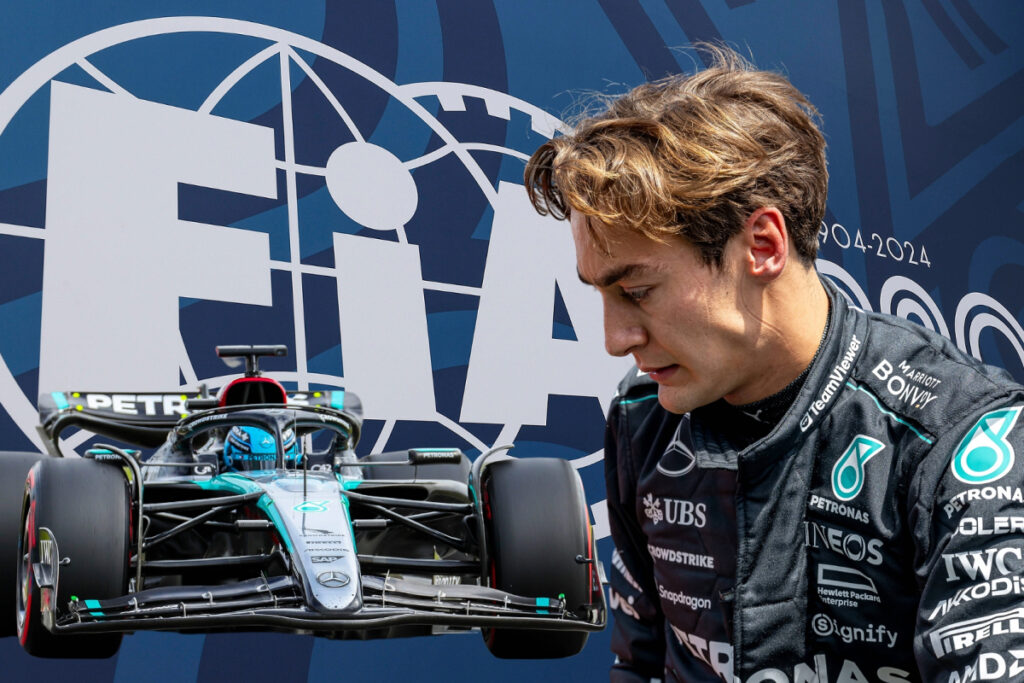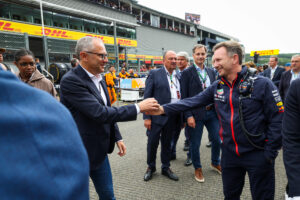Breaking: FIA announce Russell penalty verdict after Bah…read more

FIA Clears George Russell of DRS Breach at Bahrain Grand Prix
George Russell has officially retained his second-place finish at the Bahrain Grand Prix after the FIA stewards concluded an investigation into a potential rules violation involving his use of the Drag Reduction System (DRS). The Mercedes driver was summoned after suspicions arose that he may have activated DRS outside of the designated zones, which could have resulted in a time penalty and impacted his podium result.
During the race, Russell was observed opening his DRS wing flap when he was not within one second of a car ahead— a key requirement for DRS activation. Typically, drivers are only permitted to use DRS in specific zones and under particular conditions to ensure fairness. The stewards initially considered whether this constituted an unfair advantage and whether it merited a five or ten-second time penalty.
Upon detailed review, however, the FIA determined that no competitive advantage was ultimately gained from the brief DRS activation. Telemetry and race footage showed that Russell only engaged the DRS for approximately 37 meters on a 700-meter straight. Though this gave him a minor speed increase— estimated at just 0.02 seconds of time gained— he slowed down significantly at the following corner, losing 0.28 seconds in total. This self-corrective action played a significant role in the FIA’s decision not to impose a penalty.
In their official verdict, the FIA stewards explained that Russell’s DRS activation was not intentional misuse, but rather the result of a series of technical issues and team communication mishaps. Russell’s automatic DRS system had suffered a failure due to a problem with a timing loop, which forced the team to authorize manual activation. As part of the workaround, Russell had to rely on an auxiliary button that doubled as a backup team radio and manual DRS activation switch.
According to the stewards, Russell accidentally triggered the DRS instead of activating the team radio, which resulted in the unintended deployment. Mercedes later clarified that the button in question serves multiple functions, and in the high-pressure environment of the race, the wrong function was briefly activated. The FIA acknowledged this explanation and verified it against race data and system logs.
Additionally, the Mercedes team reported that Russell had been dealing with both brake system inconsistencies and electronic issues during the race, making his cockpit management more complex than usual. These difficulties further justified the accidental nature of the DRS activation.
After evaluating all the factors— including the short duration of DRS use, the lack of actual time gained, the technical problems, and Russell’s corrective driving— the stewards concluded that there was no need for disciplinary action. As a result, George Russell’s second-place finish and the valuable championship points that come with it remain unaffected.
This outcome marks a successful weekend for the British driver, who showcased strong pace throughout the Bahrain Grand Prix. With this podium result, Russell has narrowed the gap to Red Bull’s Max Verstappen in the drivers’ standings, setting up what could become a thrilling title battle as the season progresses.
For Mercedes, the decision is a relief as it maintains momentum at the start of the 2025 Formula 1 season. The team will now focus on resolving the technical issues that contributed to the DRS confusion to avoid similar incidents in upcoming races.
In summary, Russell’s minor rule breach was deemed to be accidental and insignificant in terms of race impact. Thanks to a thorough investigation and transparent data, the FIA ruled in his favor, preserving his Bahrain Grand Prix podium and reinforcing the importance of context in Stewarding decisions.





